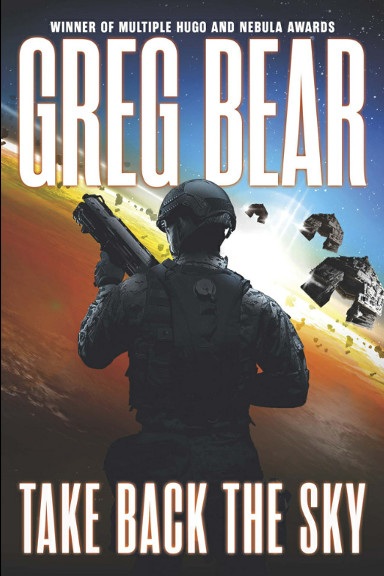
The novel “Take Back the Sky” by Greg Bear was published for the first time in 2016. It’s the third book in the War Dogs trilogy and follows “Killing Titan“.
Master Sergeant Michael Venn and a group of Skyrines – Sky + marines – discovered at least some truths about the aliens known as Gurus and the support they’re providing to humans in the war against the Antag (Antagonist) aliens. The consequence is that they risk having to fight other humans who are convinced that they’re traitors.
For Michael Venn’s group, the only hope of achieving peace in the solar system is to continue their journey to the Kuiper Belt and the mysterious Planet X. New fragments of information that include those about the solar system’s remote past are always likely to cause greater alienation. Only direct contacts with the Antags can bring crucial pieces of a puzzle that will determine the future of various species.
The War Dogs trilogy began as military science fiction, with the war between humans and the Antag aliens in the first book. Already in the second book there was a significant change with Michael Venn and a group of fellow soldiers who started discovering pieces of the solar system’s history, even very ancient, and found themselves traveling to Saturn’s moon Titan. “Take Back the Sky” has a development similar to the second book, taking the characters even further, physically on their journey through space and mentally on their search for answers.
Moving away from Earth like no human being has ever done before brings Michael Venn and, in different ways, his fellow soldiers to an alienation that is accentuated by the drugs they take, by the visions they have of the solar system’s past, and by the problem of finding someone they can trust. The protagonist’s story brings the War Dogs trilogy closer to certain works of the new wave current from the 1960s and 1970s and to the hallucinated stories of authors such as Philip K. Dick. The consequence is that reading it sometimes gives a dreamlike feeling and often of a fragmented reality.
After all this buildup, the ending seemed a little rushed with a sort of coda to end the protagonist’s personal story too. In the end, I had an overall impression of ups and downs in many ways similar to what Greg Bear’s novels have been giving me for more than a decade: there are still ideas, and sometimes they are still really intriguing, but the way he develops them seems far from his best novels. In the War Dogs trilogy’s case, there’s a story developed on a truly remarkable scale which, however, gave me the impression that the author could do better.
Greg Bear gave his best as a hard science fiction writer, developing great technical-scientific ideas in depth. In recent years he seems to have decided to focus much less on those developments and personally I find the results less satisfactory. In the War Dogs trilogy’s case he could have compensated with better developed characters, also using their relationships. Unfortunately, the first-person narrative and the circumstances of the journey left the characters a bit crippled, a shame especially considering that they’re central in the story.
In the end, the War Dogs trilogy looks like an uneven mix of different elements in which none shines particularly. The impression is that Greg Bear didn’t know what he wanted to do with it, ending up with a work that seems almost incomplete precisely because its elements are not fully developed.
The most important revelations, the ones concerning the Gurus, arrived in the second book, “Take Back the Sky” seems sometimes a way to stretch the story with the continuation of the protagonists’ journey. Two novels, perhaps a little longer, would have been more than enough.
“Take Back the Sky” confirmed that, overall, the War Dogs trilogy seems suitable for Greg Bear’s fans and readers who prefer an adventurous science fiction and stories full of secrets to be revealed but without too many expectations.

